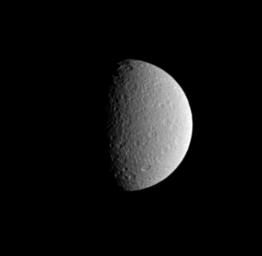
|
Rhea’s Relief
- Click the image above for a larger view
- Full-Res JPEG (664 x 648) (12.4 kB)
- Full-Res TIFF (664 x 648) (430.9 kB)
Caption:
This Cassini image shows the cratered surface of Saturn's moon Rhea, with impact craters near the terminator thrown into sharp relief. Rhea is Saturn's second-largest moon, at 1,528 kilometers (949 miles across).
This view shows the leading hemisphere on Rhea. North is up and tilted 23 degrees to the left.
The image was taken with the Cassini spacecraft narrow-angle camera on March 12, 2005, through a filter sensitive to wavelengths of ultraviolet light centered at 338 nanometers. The view was obtained at a distance of approximately 1.5 million kilometers (950,000 miles) from Rhea and at a Sun-Rhea-spacecraft, or phase, angle of 70 degrees. Resolution in the image is 9 kilometers (6 miles) per pixel.
Background Info:
The Cassini-Huygens mission is a cooperative project of NASA, the European Space Agency and the Italian Space Agency. The Jet Propulsion Laboratory, a division of the California Institute of Technology in Pasadena, manages the mission for NASA's Science Mission Directorate, Washington, D.C. The Cassini orbiter and its two onboard cameras were designed, developed and assembled at JPL. The imaging team is based at the Space Science Institute, Boulder, Colo.
For more information about the Cassini-Huygens mission, visit http://saturn.jpl.nasa.gov and the Cassini imaging team home page, http://ciclops.org .
Cataloging Keywords:
| Name | Value | Additional Values |
|---|---|---|
| Target | Rhea | |
| System | Saturn | |
| Target Type | Satellite | |
| Mission | Cassini-Huygens | |
| Instrument Host | Cassini Orbiter | |
| Host Type | Orbiter | |
| Instrument | Imaging Science Subsystem (ISS) | |
| Detector | Narrow Angle Camera | |
| Extra Keywords | Crater, Grayscale, Impact, Ultraviolet, Visual | |
| Acquisition Date | ||
| Release Date | 2005-04-28 | |
| Date in Caption | 2005-03-12 | |
| Image Credit | NASA/JPL/Space Science Institute | |
| Source | photojournal.jpl.nasa.gov/catalog/PIA06637 | |
| Identifier | PIA06637 | |
